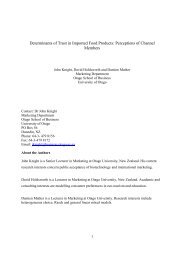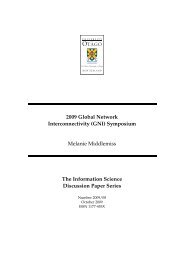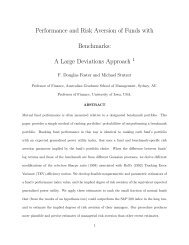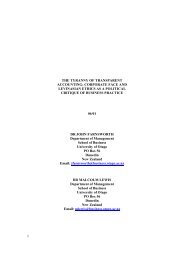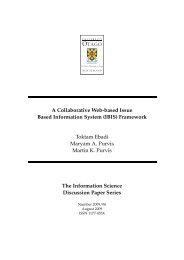Where is R2P grounded in international law? Anne-Marie Judson A ...
Where is R2P grounded in international law? Anne-Marie Judson A ...
Where is R2P grounded in international law? Anne-Marie Judson A ...
You also want an ePaper? Increase the reach of your titles
YUMPU automatically turns print PDFs into web optimized ePapers that Google loves.
plann<strong>in</strong>g and superv<strong>is</strong>ion of military operations”. 130 It <strong>is</strong> clear that there are three<br />
d<strong>is</strong>t<strong>in</strong>ct areas that the court will assess before mak<strong>in</strong>g a dec<strong>is</strong>ion on attribution; these<br />
are firstly <strong>in</strong>structions that are given, secondly the directions and lastly the control of<br />
the private <strong>in</strong>dividual, persons or company that <strong>is</strong> <strong>in</strong> question. 131 Each <strong>in</strong>dividual case<br />
would be assessed on its own merits and the court would decide whether the control<br />
was <strong>in</strong>dicative of the breach <strong>in</strong> question.<br />
WHAT HAPPENS WHEN THERE IS AN ABSENCE OF GOVERNMENTAL<br />
CONTROL?<br />
There are some <strong>in</strong>stances where there <strong>is</strong> no government <strong>in</strong> control of the breach or of<br />
the violations that have taken place. Th<strong>is</strong> may <strong>in</strong>clude revolutions, coups d’état, armed<br />
conflict, an occupation or where the state <strong>is</strong> <strong>in</strong> between government authority and<br />
control, <strong>in</strong>clud<strong>in</strong>g d<strong>is</strong><strong>in</strong>tegration of government departments or suppression of<br />
government or where a transitional government <strong>is</strong> tak<strong>in</strong>g place. Th<strong>is</strong> may mean that<br />
there <strong>is</strong> an absence of regular forces <strong>in</strong>clud<strong>in</strong>g police and or military forces, <strong>in</strong>clud<strong>in</strong>g<br />
but not limited to air force, ground patrols and/or navy. In these particular situations<br />
the civilians may take up arms <strong>in</strong> self-defence: th<strong>is</strong> <strong>is</strong> called an action of necessity.<br />
<strong>Where</strong> civilians take up actions of governmental authority <strong>in</strong> the absence of<br />
governmental control the state <strong>is</strong> still liable for attribution of the breaches <strong>in</strong><br />
<strong>in</strong>ternational <strong>law</strong>. In the Yeager v. Islamic Republic of Iran case 132 it was held that the<br />
guards acted as the governmental authority of the state. The Iran United States<br />
Claims Tribunal at the time said that the actions “exerc<strong>is</strong>ed elements of governmental<br />
authority <strong>in</strong> the absence of official authorities, <strong>in</strong> operations of which the new<br />
government must have knowledge and to which it did not specifically object”.<br />
Article 9 of the ILC draft Articles (2001) describes the rules as be<strong>in</strong>g:<br />
The conduct of a person or group of persons shall be considered an act of the<br />
state under <strong>in</strong>ternational <strong>law</strong> if the person or group of persons <strong>is</strong> <strong>in</strong> fact<br />
exerc<strong>is</strong><strong>in</strong>g elements of the governmental authority <strong>in</strong> the absence or default of<br />
130 ILM, Volume 38, no 6 (1999) page 1546, para 145 <br />
131 See ILC commentaries on the Draft Articles page 48 <br />
132 Yeager v. Islamic Republic of Iran (1987) 82 ILR 179, page 104, para 43 <br />
<br />
49




